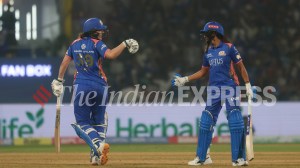Scriptures may be copyright-free, but adaptations are protected: What HC has said
Large-scale infringement of copyright of publisher Bhaktivedanta Book Trust, set up by ISKCON founder Srila Prabhupada, says court. How does copyright of religious texts work?
 Indian copyright law protects “original work” — a creative and independently created expression fixed in a tangible medium. The law grants the creator/ author of the work the exclusive right to “use, reproduce, distribute, perform, and display their work”. (Image via Pixabay)
Indian copyright law protects “original work” — a creative and independently created expression fixed in a tangible medium. The law grants the creator/ author of the work the exclusive right to “use, reproduce, distribute, perform, and display their work”. (Image via Pixabay) The Delhi High Court has found “large-scale infringement” in the reproduction on the Internet “of… copyrighted works” of the Bhaktivedanta Book Trust, which publishes books and commentaries on Indian religious philosophy and spiritualism, especially classic Vaishnava texts.
In an order on September 21, Justice Prathiba M Singh allowed the trust to approach tech companies Google and Meta, who own YouTube and Instagram respectively, with takedown orders against those reproducing copyrighted works on the Srimad Bhagavad Gita.
The Bhaktivedanta Book Trust was established in 1970 by Bhaktivedanta Swami Prabhupada (Srila Prabhupada), who also founded the Gaudiya Vaishnava religious organisation International Society for Krishna Consciousness (ISKCON), colloquially known as the Hare Krishna Movement.
Are religious texts protected by copyright?
Religious scriptures are in the public domain, and in copyright law, no exclusive intellectual property rights apply to creative works in the public domain. So, the Old Testament and New Testament, or the King James Version (KJV) of the Bible, one of the most widely used translations of the Bible, are not protected by copyright.
However, many modern translations of the Bible are copyright-protected because they represent new creative works by the translators.
For example, the New International Version (NIV), which was first published in 1978, is copyright-protected, and permission would be needed — or the terms set by the holder of the copyright would have to be followed — in order to use the NIV text for certain purposes. Also, while the Ramayana and Mahabharata are not protected by copyright, the television series Ramayana created by Ramanand Sagar or B R Chopra’s Mahabharata are “transformative works” that would be protected.
What does the copyright law in India say?
Indian copyright law protects “original work” — a creative and independently created expression fixed in a tangible medium. The law grants the creator/ author of the work the exclusive right to “use, reproduce, distribute, perform, and display their work”.
The law also protects transformative work which is a creative/ artistic work that takes existing material (text, music, art) and significantly modifies, reinterprets, or builds upon it to create something new and distinct. For example, the comedy group AIB’s 2015 spoof video ‘Every Bollywood Party song’ starring the late actor Irrfan, was a parody of rapper Yo Yo Honey Singh’s ‘Party all night’, and it would not amount to infringement as it can be termed as inspired work.
What was the case of the petitioner Bhaktivedanta Book Trust?
The trust said that its founder’s works published in various Indian and foreign languages had “simplified the religious books and scriptures” making it easy for the common man to understand. The copyright of his work would vest with the trust after he died in 1977.
The trust claimed that certain websites, mobile apps, and Instagram handles were making available a large number of the trust’s copyrighted works “almost in a verbatim manner on their online platforms” without its permission, which amounted to infringement.
And what did the HC say?
In its interim order, the court said adaptation of the scriptures, including “explanation, meaning, interpretation or creating any audio visual works”, would be entitled to copyright protection. The court said this is so because these are the original works of the authors themselves.
“Thus, there can be no objection in the actual reproduction of the text of Srimad Bhagavad Gita or similarly other spiritual books. However, the manner in which the same is interpreted by different gurus and spiritual teachers being varied in nature, copyright would vest in respect of the original parts of the literary works which preach, teach or explain the scripture,” the court said.
The HC added that since Srila Prabhupada had himself handed over the copyrights to be administered by the trust, the works cannot be “reproduced without authorization, licence or the permission” of the trust.
The HC found that the shlokas in Prabhupada’s books, as well as their anuvaad (translation) and tatparya (intention) had been reproduced by the defendant entities. The court agreed that if not checked, such piracy would cause an “immense loss” of revenue to the trust.
- 01
- 02
- 03
- 04
- 05






































